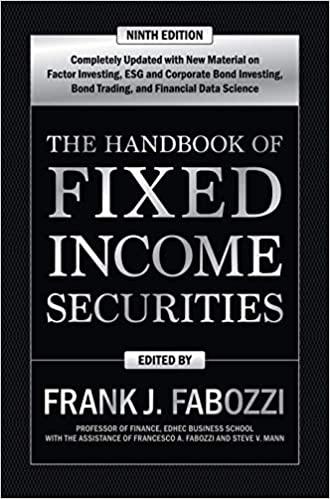Question
24. An increase in the growth rate of the money supply is most likely to be followed by A. A recession B. A decline in
24. An increase in the growth rate of the money supply is most likely to be followed by
A. A recession
B. A decline in the business cycle
C. Inflation
D. All of the above
25. A sharp decrease in the growth rate of the money supply is most likely to be followed by
A. A decline in economic activity
B. An upswing in the business cycle
C. Inflation
D. All of the above
26. The process of channeling funds from individuals with surplus funds to those desiring additional funds in which the security issued by the borrower is not purchased by the saver is known as
A. Theft
B. Redistribution
C. Barter
D. Financial intermediation
27. Banks are the most important part of the study of how money affects the economy since
A. Banks play a critical role in the creation of money
B. Banks have been important in the rapid pace of financial innovation
C. Both (a) and (b) are correct
D. Neither (a) nor (b) are correct.
28. Suppose that due to the fear that the United States is about to enter a long period of stagnant growth, stock prices fall by 50% on average. Predict what would happen to the spending by consumers.
A. Spending would probably increase
B. Spending would probably fall
C. Spending would probably be unaffected
D. The change in spending would be ambiguous
29. An increase in interest rates is likely to cause spending on houses to
A. Fall
B. Rise
C. Rise in the short run if interest rates are expected to fall in the future
D. Remain unchanged
30. Assume that the large budget deficits have significant impacts on the level of interest rates. In which market will budget deficits have their biggest Impacts directly?
A. The stock market
B. The bond market
C. The wheat market
D. The gold market
31. An increase in the value of the dollar relative to all foreign currencies means that the price of foreign goods purchased by Americans
A. Increase
B. Falls
C. Remains unchanged
D. There is not enough information to answer
32. If the price level is 100 in year 1 and 110 in year 2. Then the rate of inflation from year 1 to year 2 is
A. 10%
B. 9%
C. 11%
D. 110%
Step by Step Solution
There are 3 Steps involved in it
Step: 1

Get Instant Access to Expert-Tailored Solutions
See step-by-step solutions with expert insights and AI powered tools for academic success
Step: 2

Step: 3

Ace Your Homework with AI
Get the answers you need in no time with our AI-driven, step-by-step assistance
Get Started


